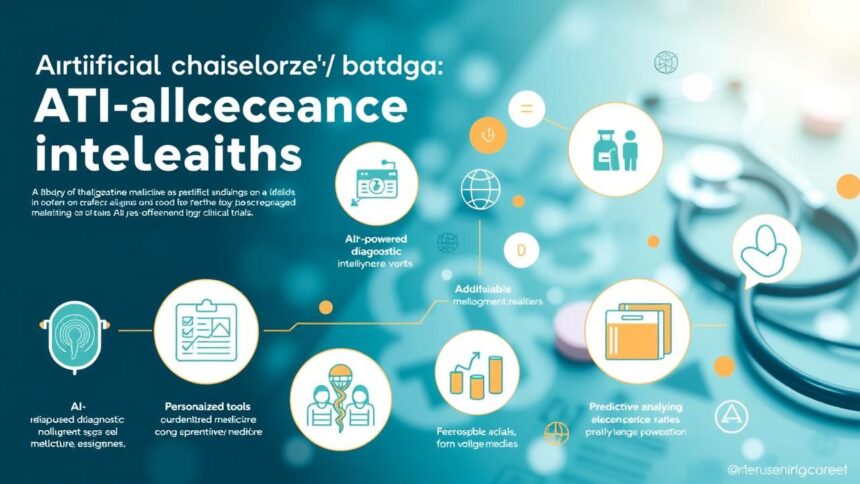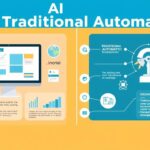Revolutionizing Healthcare: Top AI Use Cases That Saved Lives and Transformed Patient Care
1. Introduction to Artificial Intelligence in Healthcare
Artificial Intelligence (AI) has been making waves in various sectors, and healthcare is no exception. The integration of AI in patient care and medical research has led to groundbreaking advancements that are saving lives and transforming the way we approach healthcare. From diagnosing diseases more accurately to predicting patient outcomes, AI is proving to be a game-changer. But how exactly is AI revolutionizing healthcare? Let’s dive into some of the top AI use cases that are making a significant impact.
2. AI-Powered Diagnostic Tools
One of the most profound ways AI has transformed healthcare is through its diagnostic capabilities. AI algorithms can analyze medical images, such as X-rays, MRIs, and CT scans, with incredible accuracy. These tools are not only faster but also more precise than human specialists in some cases.
2.1. Early Disease Detection
Early detection is crucial for the successful treatment of many diseases, including cancer. AI-powered diagnostic tools have been instrumental in detecting cancer at its earliest stages. For example, AI systems can analyze mammograms to detect breast cancer with a higher degree of accuracy than radiologists. The ability to catch diseases early can significantly improve patient outcomes and save lives.
- Breast cancer detection: AI tools analyze mammograms with high accuracy, detecting cancerous cells that might be missed by human eyes.
- Lung cancer screening: AI can identify lung nodules in CT scans that could be indicative of lung cancer, prompting further investigation and treatment.
- Skin cancer diagnosis: AI-powered apps can analyze photos of skin lesions, helping doctors to make more accurate diagnoses.
2.2. Diagnostic Assistance in Rural Areas
In remote or under-resourced areas, access to specialized medical diagnostics can be challenging. AI-powered diagnostic tools can bridge this gap by providing accurate assessments without the need for highly specialized personnel. This means that patients in rural areas can receive timely and accurate diagnoses, leading to better healthcare outcomes.
3. Personalized Medicine and Treatment Plans
AI is transforming the concept of personalized medicine, allowing healthcare providers to tailor treatment plans specific to individual patients. By analyzing patient data, AI can help in identifying the most effective treatment options, minimizing side effects, and improving overall healthcare outcomes.
3.1. Genomic Analysis
Genomics plays a crucial role in personalized medicine. AI can analyze vast amounts of genomic data to identify genetic markers associated with diseases. This information is invaluable for creating tailored treatment plans. For instance, if a patient has a genetic predisposition to a certain type of cancer, AI can suggest preventative measures or targeted therapies that are more likely to be effective.
- Cancer treatment: AI analyzes genetic mutations to recommend personalized treatment options, such as targeted therapies.
- Pharmacogenomics: AI helps in understanding how a patient’s genetic makeup affects their response to medications, ensuring the right drug and dosage.
- Predictive analytics: AI models predict the likelihood of developing certain conditions based on genetic information, allowing for proactive healthcare.
3.2. Drug Discovery and Development
AI is accelerating the drug discovery process by identifying potential drug candidates faster and more efficiently. Traditional drug discovery can take years and cost millions of dollars. AI streamlines this process by analyzing molecular data and predicting how different compounds will interact with biological systems. This not only speeds up the development of new drugs but also reduces the associated costs.
- Target identification: AI identifies biological targets for drug development, focusing research efforts more effectively.
- Drug repurposing: AI finds new uses for existing drugs, expediting the approval process and bringing more treatment options to patients.
- Virtual screening: AI models screen large libraries of compounds to find potential drug candidates, significantly reducing the time and cost of early-stage drug discovery.
4. Predictive Analytics for Patient Outcomes
Predictive analytics is another powerful application of AI in healthcare. By analyzing patient data, AI can forecast potential health issues, enabling proactive intervention. This is particularly useful for chronic conditions, where early intervention can greatly improve patient outcomes.
4.1. Hospital Readmission Rates
One of the most significant challenges in healthcare is preventing hospital readmissions. Through predictive analytics, AI can identify patients at high risk of readmission. This information allows healthcare providers to implement preventive measures, ensuring that patients receive the care they need to stay healthy after discharge. In the UK, AI has been used in numerous hospitals to predict the risk of patients needing to come back into the hospital and saved millions of pounds in needless healthcare spend.
- Risk stratification: AI models identify patients at higher risk of readmission, prioritizing follow-up care.
- Personalized treatment plans: AI helps in creating individualized care plans that address specific risks and concerns.
- Continuous monitoring: AI-powered wearables and remote monitoring systems track patient health in real-time, alerting healthcare providers to potential issues.
4.2. Chronic Disease Management
Chronic diseases like diabetes, heart disease, and asthma require ongoing management. AI can help in managing these conditions by predicting potential complications and suggesting preventive actions. For example, AI can analyze blood sugar levels, blood pressure, and other biomarkers to predict the likelihood of a diabetic patient developing retinopathy or neuropathy. This early warning system allows for timely intervention and better disease management.
- Predictive alerts: AI systems send alerts to patients and healthcare providers when potential issues are detected.
- Personalized recommendations: AI offers tailored advice on lifestyle changes, medication, and other interventions to manage chronic conditions effectively.
- Continuous data collection: AI-powered devices collect and analyze health data over time, providing a comprehensive view of a patient’s health status.
5. AI in Clinical Trials and Research
Clinical trials are essential for developing new treatments and understanding the efficacy of existing ones. AI can greatly enhance the efficiency and effectiveness of clinical trials by identifying suitable participants, monitoring trial progress, and analyzing trial data. This can lead to faster and more accurate findings, bringing new treatments to market sooner.
5.1. Participant Identification
Identifying the right participants for clinical trials can be a time-consuming process. AI can sift through vast amounts of patient data to find individuals who meet the specific criteria for a trial. This not only accelerates the recruitment process but also ensures that the trial results are more reliable and applicable to a broader population.
- Data mining: AI tools scan electronic health records (EHR) to identify potential participants.
- Patient matching: AI algorithms match patients to suitable trials based on their health profiles and medical history.
- Predictive modeling: AI models predict which patients are most likely to respond positively to a new treatment, improving trial outcomes.
5.2. Real-Time Monitoring and Adaptive Trials
Traditional clinical trials follow a rigid protocol, but AI allows for adaptive trials that can be modified in real-time based on interim results. This flexibility means that trials can be adjusted to maximize effectiveness and safety, potentially leading to faster approval of new treatments. AI can also monitor participants in real-time, ensuring that any adverse reactions are quickly identified and addressed.
- Dynamic adjustments: AI-driven adaptive trials can change protocols mid-way if necessary, based on preliminary data.
- Real-time monitoring: AI systems track participants’ health data in real-time, flagging any concerns promptly.
- Enhanced safety: AI ensures that participants are monitored closely, reducing the risk of adverse events.
6. The Future of AI in Healthcare: Challenges and Opportunities
While AI has made remarkable strides in healthcare, there are still challenges to overcome. Issues such as data privacy, regulatory compliance, and the need for large amounts of high-quality data can hinder AI’s potential. However, the opportunities are vast, and as AI technology continues to evolve, its impact on healthcare will only grow stronger. Collaboration between healthcare providers, technologists, and policymakers will be crucial in navigating these challenges and fully realizing the benefits of AI in healthcare.
7. Conclusion
The integration of AI in healthcare is revolutionizing patient care and saving lives. From early disease detection to personalized treatment plans and predictive analytics, AI offers a myriad of possibilities that can transform the way we approach healthcare. While there are challenges to overcome, the benefits are undeniable. As we continue to explore and develop AI applications in healthcare, we can look forward to a future where medical care is more accurate, efficient, and personalized than ever before. So, let’s embrace this technological revolution and harness the power of AI to create a healthier world for all.
Are you ready to see how AI can transform your healthcare experience? Join the conversation and share your thoughts on how AI is changing the way we approach healthcare!










